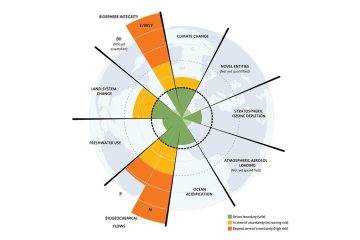Table of Contents
- Introduction to the Planetary Data Ecosystem and Its Significance
- Key Components of a Robust Planetary Data Ecosystem
- Challenges Facing the Planetary Data Ecosystem Today
- Best Practices for Leveraging Planetary Data in Research
- Future Trends and Innovations in Planetary Data Management
- Q&A
- In Retrospect

Introduction to the Planetary Data Ecosystem and Its Significance
In the rapidly evolving landscape of space science, the planetary data ecosystem acts as a crucial backbone. This ecosystem encompasses a wide range of data sources, tools, and processes that facilitate the collection, analysis, and dissemination of information about celestial bodies. With advancements in technology, we now have the means to capture extensive data from various missions and observatories, enabling researchers to enhance their understanding of planetary atmospheres, surfaces, and potential for life. As a result, the integration of diverse data sets has opened new avenues for exploration and discovery.
At the heart of this ecosystem are multiple entities, including space agencies, research institutions, and private organizations, all working collaboratively to curate and interpret planetary data. These collaborations foster a more profound understanding of planetary phenomena, promote innovation in data analysis techniques, and enhance the educational efforts that inspire future generations of scientists. By making data readily accessible, researchers can leverage a wealth of information derived from missions such as Mars rovers, lunar landers, and astrobiology satellite observations.
The significance of the planetary data ecosystem extends to numerous fields, as it intersects with various scientific disciplines. Key benefits include:
- Enhanced Scientific Research: Opportunities for breakthroughs in our understanding of planetary formation, climate evolution, and potential biosignatures.
- Global Collaboration: International partnerships that promote the exchange of ideas and methodologies among scientists and institutions worldwide.
- Public Engagement: Initiatives designed to involve the public in space exploration through citizen science projects, thereby cultivating a broader interest in planetary sciences.
Ultimately, this ecosystem not only serves scientists but also acts as a platform for education and engagement, ensuring that the mysteries of our universe continue to inspire curiosity and investigation.

Key Components of a Robust Planetary Data Ecosystem
A robust planetary data ecosystem integrates multiple dimensions that facilitate seamless collaboration and information sharing among stakeholders. At its core is data interoperability, ensuring that various data formats can effectively communicate with each other. This is essential in a space where diverse data sources such as satellites, ground stations, and research institutions contribute vast amounts of information. Standardized protocols and application programming interfaces (APIs) help streamline this process, allowing for reliable data exchange and fostering partnerships that enhance our understanding of planetary systems.
Another critical component is data quality and validation. High-quality data is foundational for producing accurate analyses and informed decisions. Implementing rigorous quality control measures and validation processes ensures that the information being utilized is credible and reliable. This includes regular audits, peer reviews, and the incorporation of advanced algorithms that can detect anomalies within datasets. The focus here is not just on collection but on maintaining integrity throughout the lifecycle of the data, which ultimately enhances trust among users.
Lastly, user engagement and community involvement play a vital role in sustaining a dynamic data ecosystem. Encouraging contributions from a broad audience—ranging from professional scientists to citizen scientists—can greatly enrich the data available and foster innovation in analyses and applications. Platforms that allow for feedback, collaboration, and sharing of results promote an inclusive environment where diverse perspectives lead to holistic insights. By prioritizing community-driven data initiatives, the ecosystem remains adaptable and responsive to emerging challenges in planetary research.

Challenges Facing the Planetary Data Ecosystem Today
As the demand for planetary data increases, several significant obstacles challenge the ecosystem that supports its collection, dissemination, and utilization. One prominent issue is the fragmentation of data sources, which can lead to inconsistencies and gaps in the information available to researchers, policymakers, and the public. Various organizations and agencies collect planetary data, but without standardized formats or protocols, integrating this information becomes a complex endeavor. This lack of cohesion may inhibit the potential for collaborative research and the comprehensive analysis necessary to address planetary challenges effectively.
Another pressing challenge is the accessibility and usability of data. While technological advancements have enabled the collection of vast amounts of planetary data, many datasets remain locked within institutional repositories or are only available to a select group of users. This situation exacerbates inequalities, as smaller institutions and independent researchers may lack the resources to access and analyze critical information. Furthermore, even when data is available, it often requires specialized knowledge or technical skills to interpret effectively, alienating potential users and stymying innovative applications.
there is a growing concern around data governance and ethical considerations. As the amount of planetary data continues to swell, so too does the need for established frameworks that address issues such as data privacy, ownership, and stewardship. Stakeholders must navigate a complex web of regulations, ethical dilemmas, and public expectations surrounding data usage. Without clear policies and collaborative approaches, the potential for misuse or misinterpretation of planetary data not only threatens individual rights but could also impede progress in addressing global challenges like climate change and biodiversity loss.
Best Practices for Leveraging Planetary Data in Research
To effectively utilize planetary data in research, it is essential to establish a collaborative framework among researchers across various disciplines. By fostering collaboration, scientists can share insights, methodologies, and datasets, leading to more comprehensive analyses. Engagement with stakeholders such as universities, government agencies, and private organizations is crucial. Regular workshops and seminars can enhance knowledge exchange, while online platforms can facilitate ongoing communication and resource sharing.
Another vital aspect is the implementation of interoperability standards. These standards allow researchers to access and share data seamlessly, thus eliminating silos that often impede scientific progress. By adopting recognized formats for data storage and sharing, researchers can ensure compatibility and enhance the usability of the data. Organizations like NASA and ESA provide robust frameworks and guidelines, which can serve as a backbone for developing interoperable systems. Key standards to consider include:
- OGC Standards: These facilitate geospatial data sharing.
- ISO 19115: This standard pertains to geographic metadata.
- CF Conventions: Useful for netCDF data formatting.
Moreover, ensuring data quality and integrity is paramount. Researchers should implement a cycle of data validation and verification to maintain high standards. Regular audits and peer reviews can help identify anomalies and enhance the credibility of the research outcomes. Employing automated tools for monitoring data integrity can streamline this process. Here’s a simple overview of effective practices:
| Practice | Description | Benefit |
|---|---|---|
| Data Sharing Protocols | Establish clear guidelines for sharing datasets | Promotes collaboration and reuse |
| Regular Data Audits | Conduct thorough checks for data accuracy | Ensures reliability of research findings |
| Version Control | Use versioning systems for data updates | Tracks changes and maintains consistency |

Future Trends and Innovations in Planetary Data Management
Certainly! Here’s a section of content for the specified heading:The advancements in planetary data management are set to revolutionize how we understand and utilize data from celestial bodies. As technology evolves, cloud computing and big data analytics are paving the way for enhanced collaboration and data accessibility. Researchers and organizations can now share vast amounts of planetary data across platforms, enabling real-time analysis and fostering innovative discoveries. The integration of artificial intelligence in data parsing will allow for faster processing rates and more accurate predictions of planetary phenomena.
As we look toward the future, machine learning algorithms are becoming increasingly integral in managing planetary datasets. With the capacity to predict trends and identify anomalies, these algorithms can assist in automating the data collection process from satellites and rovers. This shift not only streamlines workflows but also permits scientists to channel their focus toward hypothesis-driven research. Furthermore, employing edge computing will help in processing data closer to its source, reducing latency and enhancing the overall efficiency of planetary exploration missions.
| Technology | Impact on Data Management |
|---|---|
| Cloud Computing | Enhances accessibility and collaboration |
| AI & Machine Learning | Enables real-time data analysis and anomaly detection |
| Edge Computing | Reduces latency and improves processing efficiency |
The integration of interoperability standards will also play a critical role in the future of planetary data management. By standardizing data formats and protocols, various stakeholders—from government agencies to private organizations—can work seamlessly together, ensuring that valuable planetary information is not siloed. Moreover, the implementation of open-source platforms may democratize access to data, encouraging innovations from both established researchers and new entrants in the field. This collective effort will not only broaden our understanding of the cosmos but also inspire the next generation of planetary scientists.
This content presents a forward-thinking view on innovations in planetary data management, formatted appropriately for WordPress, including a styled table for enhanced clarity and engagement.


0 Comments